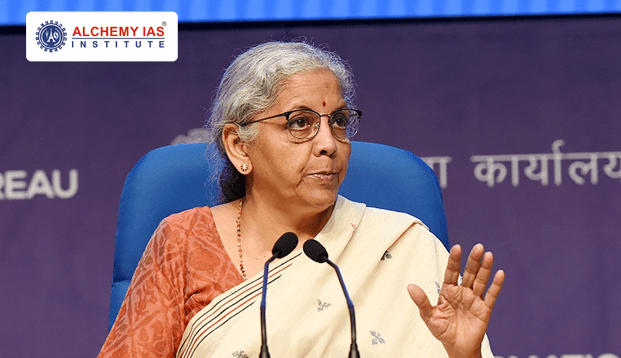6th February, 2024 (Tuesday)
| CONTENT LIST | ||
| Topics | Syllabus | |
| 1 | Motion of Thanks | GS. 2: Indian Polity: Devices of the Parliament |
| 2 | The White Paper on the economy | GS.3: Indian Economy: Public Finance |
| 3 | Kaladan Multimodal Transit Project | GS.2: International Relations: Act East Policy |
| 4 | QUAD grouping | GS.2: International Relations: Indo-Pacific Region |
| 5 | The Public Examination Bill, 2024 | GS.2: Governance – Public Employment |
| 6 | Grammy Awards, 2024 | Prelims Exclusive: Awards in News |
MOTION OF THANKS
Syllabus: GS. 2: Indian Polity: Devices of the Parliament
Why it’s in the News: The Prime Minister, Shri Narendra Modi, addressed the motion of thanks on the President’s speech to Parliament in the Lok Sabha during the ongoing budget session.

About Motion of Thanks
- A Motion of Thanks is proposed in both the Lok Sabha and the Rajya Sabha following the President’s address, typically presented by a member of the ruling party.
- This motion initiates debates in both houses.
- Subsequently, the Prime Minister addresses concerns raised by the opposition regarding the President’s speech.
- President’s Address:
- After each general election and the first session of every fiscal year, the President addresses Houses of Parliament, outlining government policies and programs for the previous and upcoming years.
- This address, termed a Special Address, precedes any other parliamentary business.
- Motion of Thanks:
- Comparable to the ‘Speech from the Throne’ in Britain, the Motion of Thanks is debated in both Houses.
- Typically, three days are allocated for this discussion, during which members can address national or international issues.
- The Motion is subject to a vote at the conclusion of the debate, requiring approval to avoid signaling government defeat.
- Discussion and Voting:
- Discussion on matters from the President’s Address occurs through a Motion of Thanks moved and seconded by members selected by the Prime Minister.
- The PM’s reply concludes the debate, sometimes resulting in amendments to the Motion.
- Once adopted, the Motion is conveyed to the President by the respective Chairs of the Rajya Sabha and Lok Sabha, with the President acknowledging it via a letter read out in Parliament, thus concluding the process.
WHITE PAPER ON INDIAN ECONOMY
Syllabus: GS.3: Indian Economy: Public Finance
Why it’s in the News: Following Finance Minister Nirmala Sitharaman’s announcement in the Interim Budget 2024-25, the government plans to issue a White Paper on the Indian economy.

About White Paper on Indian Economy
- What is a White Paper:
- A White Paper is a government document that provides authoritative information or proposals on a specific issue or policy.
- It offers a detailed examination of the subject matter, backed by research and analysis.
- In this context, the White Paper on the Indian economy will focus on elucidating past economic challenges and their implications.
- Significance :
- The White Paper serves as a crucial tool for policymakers, economists, and stakeholders to understand past economic pitfalls and chart a course for recovery.
- It fosters transparency and accountability in governance by elucidating past shortcomings and outlining corrective measures.
- By promoting informed decision-making, the White Paper contributes to the formulation of effective economic policies conducive to long-term growth and development.
- Proposals and Objectives:
- The White Paper will analyze various aspects of economic management during the pre-2014 period, including fiscal policies, governance structures, and sectoral performance.
- It will highlight key proposals for addressing economic issues, such as enhancing regulatory frameworks, promoting investment, and fostering inclusive growth.
- Objectives include fostering transparency, accountability, and informed decision-making in economic governance.
KALADAN MULTI-MODAL TRANSIT PROJECT
Syllabus: GS.2: International Relations: Act East Policy
About Kaladan Multi-Modal Transit Project
ü Kaladan Multi-modal Transit Transport Project involving India and Myanmar is very important for connecting the North East and Myanmar.
ü This is part of India’s ‘Act East policy’ connecting north eastern States and the ASEAN region.
ü There is a framework agreement between India and Myanmar signed in 2008, to help in facilitating the implementation of the Kaladan Multimodal Transit Transport Project.
ü India is also involved in developing the Sittwe Port in Myanmar which is expected to emerge as the most strategic overseas port for India and is located at the estuary of Kaladan River which is in the troubled Rakhine province of Myanmar.
ü India has already constructed an inland water transport jetty at Sittwe and also a container terminal is expected to come up later.
QUAD: STRENGTHENING INDO-PACIFIC SECURITY
Syllabus: GS.2: International Relations: Indo-Pacific Region
Why it’s in the News: U.S. Ambassador Eric Garcetti suggests that due to scheduling constraints, a Quad summit in India before the U.S. elections may not be feasible. He emphasizes that the Quad agenda is poised to be more productive by the end of 2024.

About QUAD
- The Quad, or Quadrilateral Security Dialogue (QSD), is an informal strategic forum comprising the United States, India, Australia, and Japan.
- Established in 2007, its primary aim is to foster a free, open, prosperous, and inclusive Indo-Pacific region.
- Formation:
- Originally proposed by Japanese Prime Minister Shinzo Abe in 2007, the Quad’s roots can be traced back to joint relief efforts after the 2004 Tsunami and the evolution of
- Australia’s Involvement:
- Australia temporarily withdrew from the Quad due to Chinese pressure but resumed participation in naval exercises in 2010.
- The concept of an ‘Asia Democratic Security Diamond’ was emphasized in 2012 by Japan, further solidifying the group’s objectives.
- Principles:
- The Quad seeks to maintain strategic sea routes free from military and political coercion, countering Chinese influence in the region.
- It aims to uphold a rules-based global order, ensure freedom of navigation, and provide alternative financing options for Indo-Pacific nations.
- Quad Summits:
- Recent Quad summits in 2022 and 2023 have focused on maritime security, space cooperation, climate change, health, and cyber security. Member nations reaffirmed their commitment to a rules-based maritime order and opposed coercive actions in the East and South China Seas.
- Significance for India:
- India views the Quad as a strategic counterbalance to China’s growing economic and military power.
- It offers a platform for collaboration and support in times of border tensions, as well as opportunities for naval exploration in the Indo-Pacific.
PUBLIC EXAMINATION (PREVENTION OF UNFAIR MEANS) BILL, 2024
Syllabus: GS.2: Governance – Public Employment
Why it’s in the News: The Public Examinations (Prevention of Unfair Means) Bill, 2024, was introduced in Lok Sabha on February 5. The Bill aims to prevent “unfair means” in order to “bring greater transparency, fairness and credibility to the public examinations system”.
About the Public Examinations (Prevention of Unfair Means) Bill, 2024:
- What is meant by the use of “unfair means” in an examination?
- Section 3 of the Bill outlines various actions categorized as “unfair means” in public examinations, primarily for illicit gain. These actions encompass leaking question papers, tampering with answer sheets, providing unauthorized assistance, and conducting fake examinations or creating fraudulent documents.
- Identification of Public Examinations:
- A “public examination” under Section 2(k) refers to exams conducted by designated authorities listed in the Bill’s Schedule or those notified by the Central Government.
- These include prominent bodies such as UPSC, SSC, RRBs, IBPS, and NTA. Additionally, ministries and departments for staff recruitment are encompassed.
- Penalties for Violations:
- The proposed law under Section 9 makes offenses cognizable, non-bailable, and non-compoundable.
- Penalties range from three to five years of imprisonment and fines up to Rs 10 lakh.
- For service providers aiding in exam conduct, fines could extend up to Rs 1 crore.
- Organized paper leaks carry even harsher punishments.
- Purpose Behind the Bill:
- The surge in question paper leaks across India prompted the government to introduce this legislation.
- Instances of leaks disrupted hiring processes for government jobs affecting millions of applicants.
- The Bill aims to introduce a comprehensive legal framework to deter unfair means, ensuring transparency, fairness, and credibility in public examinations.
- Objectives of the Bill:
- The Bill seeks to identify and deter individuals, groups, or institutions exploiting loopholes in examination systems for wrongful gains.
- It assures sincere candidates that their efforts will be fairly rewarded, emphasizing transparency and credibility.
- Notably, candidates are exempt from liability under the Bill, which also serves as a model for states to adopt, aiding in preventing criminal disruptions in state-level examinations.
GRAMMY AWARDS, 2024
Syllabus: Prelims Exclusive: Awards in News
Why it’s in the News: The 2024 Grammy Awards (66th Grammy Awards) has been a great event in terms of India’s perspective as five musicians, including tabla maestro Zakir Hussain and flautist Rakesh Chaurasia, picked up the coveted prize at a glittering ceremony in Los Angeles.

The Grammy Awards: Celebrating Musical Excellence
- Originally named ‘Gramophone Awards’, the Grammys honor outstanding musicians annually since 1959.
- The name ‘Grammy’ pays tribute to Emile Berliner’s gramophone, symbolizing the industry’s heritage.
- Categories:
- The prestigious awards cover diverse genres including pop, rock, rap, R&B, country, reggae, classical, gospel, and jazz.
- Notably, the “General Field” includes Album of the Year, Record of the Year, Song of the Year, and Best New Artist.
- Winners receive a golden statuette representing a gramophone, recognizing their exceptional contributions to music.
List of awards received by Indian musicians at the Grammy Awards 2024:
- Shakti:
- Best Global Music Album: “This Moment”
- Zakir Hussain (member of Shakti):
- Best Global Music Performance: “Pashto” (with Bela Fleck & Edgar Meyer)
- Best Contemporary Instrumental Album: “As We Speak”
- Rakesh Chaurasia:
- Best Global Music Performance: “Pashto” (with Bela Fleck & Edgar Meyer)
- Best Contemporary Instrumental Album: “As We Speak” (part of Bela Fleck & Edgar Meyer’s ensemble)
- Shankar Mahadevan (member of Shakti):
- Best Global Music Album: “This Moment”
- Ganesh Rajagopalan (member of Shakti):
- Best Global Music Album: “This Moment”
- Selvaganesh Vinayakram (member of Shakti):
- Best Global Music Album: “This Moment”
- In total, five Indian musicians received awards, with Zakir Hussain being the biggest winner with three Grammys. This was a remarkable achievement for Indian music on the global stage.

